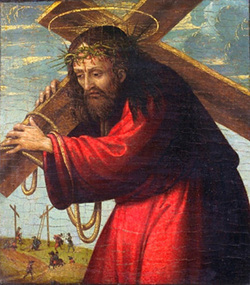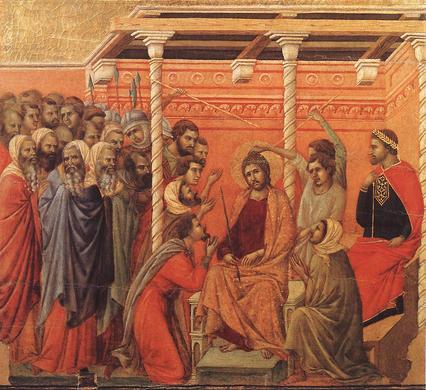
Hide me from the gathering together of the froward, and from the insurrection of wicked doers. In our consideration of this Psalm, let us contemplate our Head himself. Many Martyrs have suffered such things as the Psalmist prayeth against; but no Martyr shineth with such glory as the Head of the Martyrs. In him we best perceive what they endured. He particularly was hidden from the insurrection of wicked doers, to wit, in the sense that God the Son, who was made man, hid himself under the veil of his own flesh. For he is both Son of Man and Son of God: yea, he was the Son of God (for he was in the form of God), and as such became in the flesh the Son of Man, in the form of a servant; whereby he had power to lay down his life, and power to take it again. What could his enemies do unto him? They could only kill the body: the soul they could not kill. Give heed: it were little for the Lord to exhort the Martyrs by word, did he not confirm them by this his example.
We know what was the gathering together of the froward amongst Jewry, and what was the insurrection of wicked doers. How were they wicked doers? In that they desired to kill the Lord Jesus Christ. Many good works (saith he) have I shewed you: for which of these works do ye desire to kill me? He bore all their infirmities. He healed all their sick. He preached the kingdom of heaven. He held not his peace at their iniquities, so that they might rather hate the same, than the Physician who would heal them. Yet being ungrateful for all these his remedies, like men raging in high fever, they did rage against the Physician who had come to heal them, and took counsel for his destruction. It was as though they would put it to the proof, whether he were man that could die, or whether he were something more than man that would not suffer himself to die. In Chapter 2 of the Book of Wisdom we have, as it were, their very words: Let us examine him with despitefulness: let us condemn him with a shameful death: for he shall be visited according to his words: for if the just man be the Son of God, he will help him, and deliver him from the hand of the enemies.
They have whet their tongue like a sword. Let not Jewry say: We did not kill Christ. For they delivered him up to Pilate's tribunal in order that they should themselves seem innocent of his death. Thus when Pilate said to them: Take ye him, and crucify him: they answered: It is not lawful for us to put any man to death. So it was that they sought to cast the guilt of their crime upon a human judge: but by this could they deceive God the Judge? What Pilate did, made him perforce in some sort partaker of their crime. But in comparison with them, he was less guilty. For he did what he could to rescue him out of their hands, and therefore ordered him to be scourged and brought before them. That is to say, not by way of persecution did he scourge the Lord, but as wishing to satisfy their rage, that when they saw him scourged, they might relent, and cease to desire his death. Nevertheless he did do it. But if we hold him to be guilty who did it against his will, shall they be innocent who did force him to do it? By no means. Pilate did pronounce sentence on him, and commanded him to be crucified, and so in some wise it might be said that he did kill him. But O ye, his own Jewish people, ye in full truth did kill him. And how did ye kill him? With the sword of the tongue. For like a sword ye whet your tongue. And when did ye strike the blow, but when ye cried out: Crucify him, crucify him?





